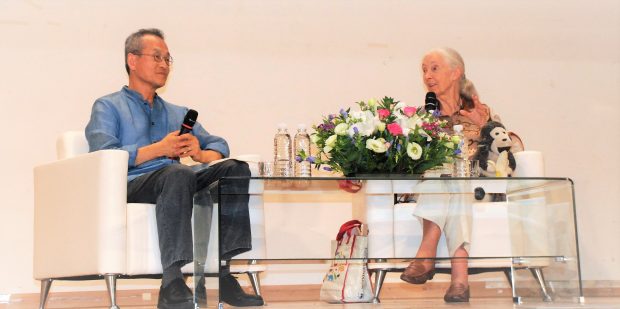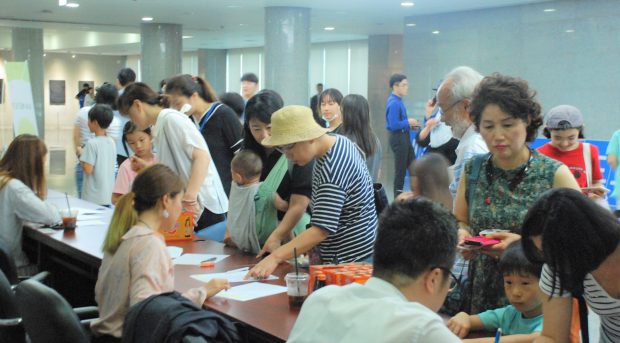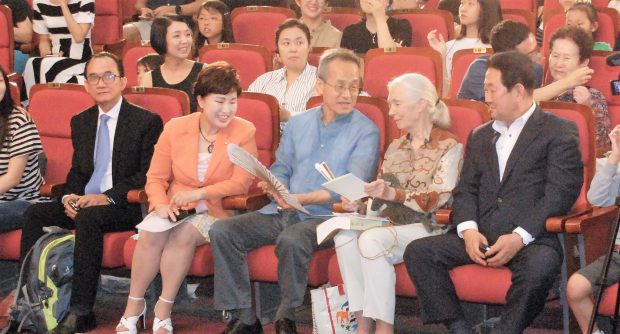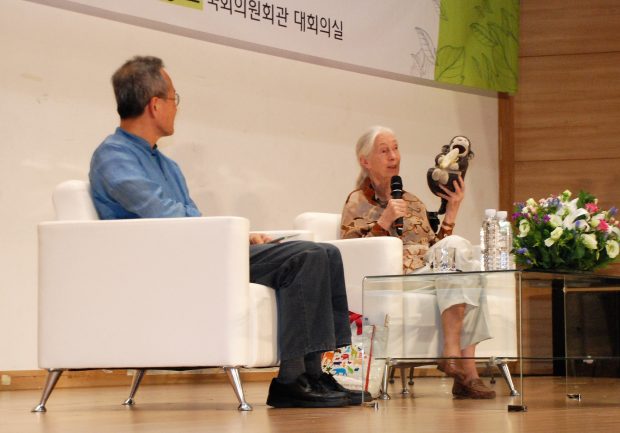Goodall’s “Window of Time to Sustain Our Environment”

Choi Jae-chun and Jane Goodall sit together for the eco-talk on saving the environment, August 10, 2017. (Photo by Baek Yoon-ha)
Yesterday, at Seoul Yeouido National Assembly Conference Center, Jane Goodall and her pupil and friend, Choi Jae-chun held a special eco-talk in front of 530 members of the audience that came by joint invitation of the Asia Journalist Association (AJA) and Jeon Hye-sook (National Assembly member). Throughout the program, Goodall and Choi strongly urged everyone the need to protect Mother Nature and all her inhabitants, suggesting the world is running out of time for significant change.

Members of the audience file in before entering the conference room (Photo by Baek Yoon-ha)
Among those in attendance were young students—children—eager to learn about the ecosystem, environmental specialists, and members of the National Assembly such as Park Ju-seon (Vice Deputy of National Assembly), Jeon Hye-sook (assembly member), and Shin Kyung-min (assembly member).

In order from the left: Eddy Suprapto (Deputy President of AJA), Jeon Hye-sook (assembly member), Choi Jae-chun, Jane Goodall, and Park Ju-seon (Vice Deputy of National Assembly) sit and greet one another before the talk. (Photo by Baek Yoon-ha)
After the introductory speeches had been made by AJA Deputy President Eddy Suprapto and the assembly members, Kim Seo-yeon, a second-grader from Hanyang elementary school welcomed Jane Goodall and Choi Jae-chun to the stage expressing her respect for Goodall’s research in Chimpanzee behavior and emotions.
At 83 years of age, Jane Goodall was delighted to meet so many of the young generation, saying that she gets most of her stamina to travel the world from those who are young and passionate about environmental issues. As she became comfortable with the guests, Goodall shared about her past experiences and life mission.
For her, it also started when she was a child. In fact, she said that she “popped out of the womb loving animals, and with a loving and supporting mother, [she] was able to achieve her dream of working with chimpanzees”.
Having always believed that animals, too, have emotions and are more similar to humans than many realize, Jane was crushed at the devastation modern urban development was inflicting on animals and their habitat. Elephant poaching for tusks that would be sold as pianos and Rhino horns for decorations seemed horrible excuses for killing innocent animals already endangered by disappearing rainforests. And as such, she decided that she had to do something to break barriers that were stopping people from respecting and protecting precious wildlife.
In 1990, Goodall founded her youth environmental campaign, Roots and Shoots. Now, almost 30 years later, she still describes Roots and Shoots as her passion. It was through this campaign that she experienced her central message: “Each single one of us matters. Each one of us makes some kind of difference every day and we have a choice of what kind of different we want to make. So many people don’t take any actions because they feel helpless and hopeless. But with our small ethical choices that we make on a daily basis; when we make these ethical choices together, we can make a difference.”

Jane Goodall holds up Mr. H, the stuffed chimpanzee she received from her friend, Gary Horn, who became blind at twenty years-old. (Photo by Baek Yoon-ha)
To touch on the continent of Asia, Choi Jae-chun asked Goodall of the incredible ecosystem surrounding the Korean DMZ. In response, Goodall acknowledged the border of the two Koreas as a wonderful site of natural habitation almost completely free of human touch. But she continued by mentioning that the world is full of such amazing ecosystems of which many are under threat due to unrestricted human material consumption and energy waste.
At this point, Goodall directly addressed the politicians in the room and worldwide, saying that politicians carry the strong responsibility of recognizing global concerns and eradicating national corruption that can be so harmful to the environment. She accused US President Trump for being blatantly ignorant to climate change, but also remained positive at the fact that many nations decided to more actively promote environmental campaigns at the US exit of the Paris Climate Accord.
And though some have postulated the extinction of humankind within 300 years, Goodall remained ever hopeful: “I choose to believe that we still have a window of time to act and change things. We can’t stop global warming, but we can slow it down as long as we change the way we live. We must change the unsustainable lifestyles we carry and stop using more of nature’s resources than nature itself can renew.” To close, she reminded everyone the Native American thought, “We haven’t inherited this planet from our parents; we are borrowing it for our children. So we must take care of it.”
By Seo Eui-mi, reporter for The AsiaN

























































